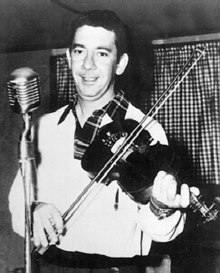
Summary
Harry Henry Choates (December 26, 1922 – July 17, 1951) was an American Cajun music fiddler known as the "Fiddle King of Cajun Swing"[2] and the "Godfather of Cajun music."[3] The scholar Barry Jean Ancelet called Choates "undoubtedly the most popular Cajun musician of his day."[4]
Harry Choates | |
|---|---|
 | |
| Background information | |
| Born | December 26, 1922 |
| Origin | Cow Island, Louisiana, U.S. |
| Died | July 17, 1951 (aged 28) |
| Genres | Cajun |
| Occupation(s) | Musician, Fiddler |
| Instrument(s) | Fiddle |
| Years active | 1934-51 |
| Labels | Gold Star, Modern Music, Starday, D Records, Deluxe, Macy's, O.T., Allied, Cajun Classics, Humming Bird[1] |
Early years edit
Much of Choates' early life is disputed. Most sources list his birthplace as the south Louisiana town of Rayne.[5][6][7] But his State of Texas death certificate lists his birthplace as New Iberia, his World War II draft card says Abbeville, and his baptismal certificate lists his place of birth as Cow Island, Louisiana, a small community located south of the town of Kaplan.[8][9] Choates' baptismal certificate lists his parents as Clarence Choate and Idolie Menard. He was born Harry Henry Choate, and added an "s" to his last name at some point after his first marriage.
The Choates had moved to Port Arthur, Texas, by 1930, part of a large migration of Cajuns to the Beaumont–Port Arthur metropolitan area for jobs in the oil patch. Harry received little schooling, instead spending time in local bars listening to music on jukeboxes. By age 12, he was playing fiddle for spare change in barbershops.
Career edit
Choates gained early professional experience playing in the bands of Leo Soileau and Leroy Leblanc, then split off to form his own group, called the Melody Boys, in 1946. His 1946 song "Jole Blon," a top 10 hit (Billboard position #4) for Choates, was recorded by Quinn Recording under the Gold Star Records label (#1314). Since Gold Star could not keep up with the demand for "Jole Blon", the record was co-released under other labels, such as Modern Music (#20-511), Starday (#187), D Records (#1024) and the Deluxe label (#6000).[10] Later, it was recorded by country singer Moon Mullican and became a major hit, but Choates had waived his rights to the song and was never compensated for its success.
Choates remained with the Melody Boys from 1946 to 1951, recording for Gold Star Records in 1946-47 and later for Macy's Recordings. The Melody Boys disbanded over Choates' chronic problems with alcoholism and his frequent missed concert dates, and shortly after the dissolution he played with Jesse James & His Gang on KTBC radio.
Death edit
In the middle of 1951, Choates was found to be in contempt of court for failing to pay his support payments for his children. He spent three days in the Travis County Jail, at which time he began hitting his head against the bars of his jail cell, eventually knocking himself into a coma. The condition persisted for several days before Choates died of the effects of his alcoholism on July 17, 1951.[11]
Legacy edit
Choates is known as the "Parrain de la musique cajun" ("Godfather of Cajun music") mainly because of his introduction of vocal wailing throughout his music.[3] In 2014, Rolling Stone magazine ranked Harry Choates' version of "Jole Blon" number 99 in its list of the 100 greatest country songs.[12]
| External audio | |
|---|---|
| "Jole Blon" (1946 Recording) | |
| "Jole Blon" |
Discography edit
Compilations edit
- Jole Blon (DLP-7000 D Records, 1979)
- Fiddle King of Cajun Swing (5027 Arhoolie, 1982)
- Five-Time Loser (KK-7453 Krazy Kat, 1986)
- Fiddle King of Cajun Swing (CD 380 Arhoolie, 1993)
- Five-Time Loser (KK CD-22 Krazy Kat, 1998)
- Jole Blon: The Original Cajun Fiddle Of Harry Choates (CD 7000 Glad, 1999)
- Cajun Fiddle King - Harry Choates (AIM 1205 AIM, 1999)
- Devil in the Bayou - The Gold Star Recordings (BCD 16355 Bear Family, 2002)
See also edit
References edit
- ^ Jasinski, Laurie E (February 22, 2012). Handbook of Texas Music (2nd ed.). Texas State Historical Assn. ISBN 978-0876112533.
- ^ "Western Swing". Houstonculture.org.
- ^ a b "HARRY CHOATES (1922-1951), the Godfather of Cajun music". Bopping.org. Retrieved 2014-06-06.
- ^ Barry Jean Ancelet (1999). Cajun and Creole Music Makers. Univ. Press of Mississippi. pp. 26–. ISBN 978-1-57806-170-9. OCLC 1022681997.
- ^ Michael McCall; John Rumble; Paul Kingsbury, eds. (1 February 2012). The Encyclopedia of Country Music (2 ed.). Oxford University Press. ISBN 978-0-19-992083-9. OCLC 1050701564.
- ^ Tony Russell (15 November 2007). Country Music Originals: The Legends and the Lost. Oxford University Press. pp. 246–. ISBN 978-0-19-804358-4. OCLC 1028576263.
- ^ John Broven (1 January 1987). South to Louisiana: The Music of the Cajun Bayous. Pelican Publishing. pp. 325–. ISBN 978-0-88289-608-3. OCLC 1001805760.
- ^ "Texas, U.S., Death Certificates, 1903-1982 for Harry Henry Choates". Ancestry.com.
- ^ "U.S., World War II Draft Cards Young Men, 1940-1947 for Harry Henry Choates". Ancestry.com. Retrieved 29 December 2021.
- ^ Bradley, Andy. Wood, Roger. "House of Hits: The Story of Houston's Gold Star/SugarHill Recording Studios". Brad and Michele Moore Roots Music Series. University of Texas Press; 1 edition (April 1, 2010).
- ^ "Harry Choates Artist Biography" by Craig Harris.Harry Choates at AllMusic
- ^ "100 Greatest Country Songs of All Time". Rolling Stone. June 1, 2014.
External links edit
- Pvt Harry H. Choates at Find a Grave


